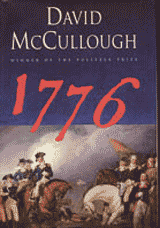 David McCullough is one of the best of contemporary historians. He writes well. He has a deep respect for original sources and for those historians who were closer to the events he's covering than himself. And he's not afraid to demonstrate his respect and even affection for the people whose lives he's undertaken to portray. McCullough deserves the many accolades that have come his way.
David McCullough is one of the best of contemporary historians. He writes well. He has a deep respect for original sources and for those historians who were closer to the events he's covering than himself. And he's not afraid to demonstrate his respect and even affection for the people whose lives he's undertaken to portray. McCullough deserves the many accolades that have come his way.Friday evening and night I spent reading McCullough's latest, his study of the most important year of the American Revolution, 1776. With an emphasis on what's happening to the Continental Army (especially General Washington), McCullough leads the reader through the hope generated by the Army's successful siege of Boston to the devastating defeats around New York that very nearly finished forever the patriots' cause to the turn-around victories of Trenton and Princeton.
Along the way, the author corrects many inaccuracies and omissions that normally exist in the characterizations of such key persons as George III; Nathaniel Greene; Henry Knox; British generals Howe, Cornwallis and Clinton; John Reed; and, by making liberal use of the General's voluminous letters, even George Washington himself. McCullough also understands much that many modern historians have neglected in their quest to be politically-correct and so he presents a clear picture of the military strategy and tactics, the Loyalists, the many seemingly Providential elements that kept the Revolutionary cause alive, the ineffectiveness of both Congress and the British, etc.
For a Christian pro-life activist like myself, fighting against a culture in love with decadence and death, David McCullough's 1776 and its stern presentation of the perseverance, principle, and courage demonstrated by the likes of Washington, Knox and Greene was quite inspirational.